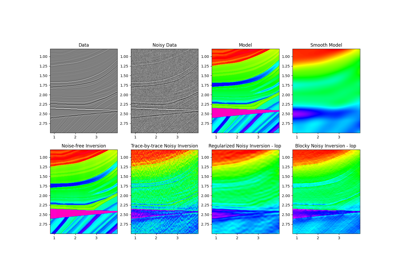pylops.avo.poststack.PoststackLinearModelling¶
-
pylops.avo.poststack.PoststackLinearModelling(wav, nt0, spatdims=None, explicit=False, sparse=False, kind='centered')[source]¶ Post-stack linearized seismic modelling operator.
Create operator to be applied to an elastic parameter trace (or stack of traces) for generation of band-limited seismic post-stack data. The input model and data have shape \([n_{t_0} \,(\times n_x \times n_y)]\).
Parameters: - wav :
np.ndarray Wavelet in time domain (must have odd number of elements and centered to zero). If 1d, assume stationary wavelet for the entire time axis. If 2d, use as non-stationary wavelet (user must provide one wavelet per time sample in an array of size \([n_{t_0} \times n_\text{wav}]\) where \(n_\text{wav}\) is the length of each wavelet). Note that the
dtypeof this variable will define that of the operator- nt0 :
int Number of samples along time axis
- spatdims :
intortuple, optional Number of samples along spatial axis (or axes) (
Noneif only one dimension is available)- explicit :
bool, optional Create a chained linear operator (
False, preferred for large data) or aMatrixMultlinear operator with dense matrix (True, preferred for small data)- sparse :
bool, optional Create a sparse matrix (
True) or dense (False) whenexplicit=True
Returns: - Pop :
LinearOperator post-stack modelling operator.
Raises: - ValueError
If
wavis two dimensional but does not containnt0wavelets
Notes
Post-stack seismic modelling is the process of constructing seismic post-stack data from a profile of an elastic parameter of choice in time (or depth) domain. This can be easily achieved using the following forward model:
\[d(t, \theta=0) = w(t) * \frac{\mathrm{d}\ln m(t)}{\mathrm{d}t}\]where \(m(t)\) is the elastic parameter profile and \(w(t)\) is the time domain seismic wavelet. In compact form:
\[\mathbf{d}= \mathbf{W} \mathbf{D} \mathbf{m}\]In the special case of acoustic impedance (\(m(t)=AI(t)\)), the modelling operator can be used to create zero-offset data:
\[d(t, \theta=0) = \frac{1}{2} w(t) * \frac{\mathrm{d}\ln m(t)}{\mathrm{d}t}\]where the scaling factor \(\frac{1}{2}\) can be easily included in the wavelet.
- wav :
